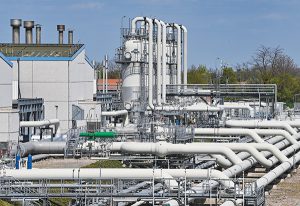Bloomberg
Russia halted gas flows to Poland and Bulgaria in a major escalation, and said it will keep supplies switched off until
the two countries agree to Moscow’s demands to pay for the fuel in rubles.
European gas prices surged 20% on Russia’s sudden move to turn its vast energy resources into a weapon against Ukraine’s allies. But prices later eased as it emerged that some European companies have taken steps to accede to Moscow’s demands, reducing the risk of a broader cutoff.
The European Union has yet to respond — beyond calling Moscow’s move “blackmail†and holding a meeting — and there’s been no action from Germany, the country most dependent on Russian gas.
Last week the bloc left the door open to a possible compromise, but the move to close the taps on EU members Poland and Bulgaria probably makes a fix less politically palatable.
The EU’s ability to remain united may now be tested:
as payment deadlines start falling due, governments and companies across Europe have to decide whether to meet the new rules or face the prospect of gas rationing.
Last month President Vladimir Putin shocked European governments and markets by demanding gas should be paid for in rubles — via a complicated mechanism involving setting up two linked bank accounts to handle the foreign exchange transaction. The EU in principle has rejected the demand, saying it would violate sanctions and strengthen Russia’s hand.
But it suggested exemptions may be possible. Uniper SE, a massive buyer of Russian gas, has said it believes it can keep buying gas without breaching sanctions.
According to a person close to Russian gas giant Gazprom PJSC, four European gas buyers have already paid for supplies in rubles, and 10 companies have opened accounts at Gazprombank that would allow them to meet the new payment rules.
The next raft of payments is due in the second half of May, according to the person.
 The Gulf Time Newspaper One of the finest business newspapers in the UAE brought to you by our professional writers and editors.
The Gulf Time Newspaper One of the finest business newspapers in the UAE brought to you by our professional writers and editors.
